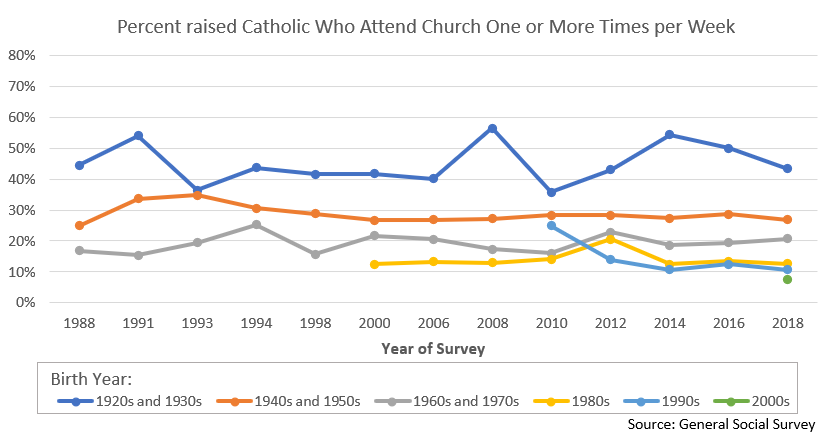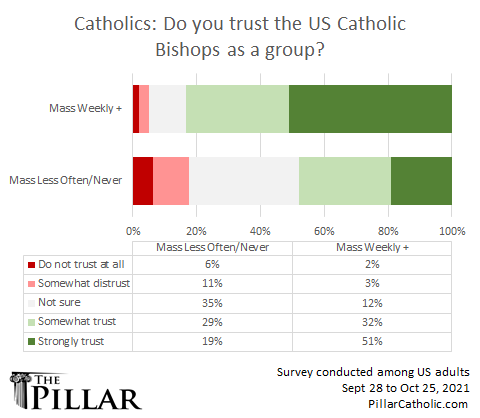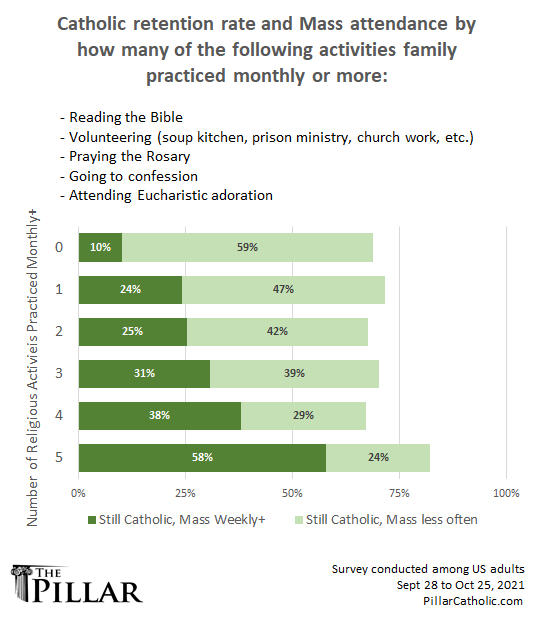I dunno, I’m in quarantine, and I have a huge backlog of Worthy Reads because I haven’t run this feature in three months. I’ve got enough material now to break it out into topics, and this week is Decline & Fall + Religion Week. (Next might be Culture + Antitrust Week.) Lezgo.
Retweets are not endorsements! I found these articles thought-provoking. There’s a good chance I agreed with something important in each, but maybe not, and, in any case, I absolutely do not endorse each and every claim made in each and every article.
“The kids are not alright – A look at US religious belief and practice,” by Brendan Hodge:

When you slice up the data in interesting ways, you get interesting results. It’s rare enough for surveys to go beyond mere religious self-identification (which is very close to statistically useless for detecting Catholics qua Catholics) to whether the subject actually attends Mass. It’s even rarer to see a survey approach the question generationally. These results are fascinating — and, very interestingly, they don’t show any significant decline in religious practice among young adults since the 1980s babies came of age.
In other words, Catholicism will bleed badly as the Silent Generation finishes dying and the Boomers start dying in earnest. The number of parishoners will shrink by… half? Three-quarters? Just eyeballing it there. But this graph suggests the decline won’t simply continue indefinitely until the Catholic Church vanishes from the United States; it will eventually hit a floor and stop.
Will this be the “smaller, purer Church… a Church that has lost much” that Fr. Ratzinger spoke of, long before he became pope? Or will it be a hellscape where the only Catholics left are the ones who argue angrily on the Internet — Mark Shea and Austin Ruse throat-punching each other in the corridor between universes for all eternity?
Dunno! We’ll find out. Speaking of which…
“Catholic Ideas and Catholic Realities,” by Ross Douthat:
…in a shrinking Church, the influence of its more committed members will wax, not wane. The diocesan fundraisers of the future will be hitting up populists and integralists, and perhaps even tradinistas, because the lukewarm cradle-Catholic donors of the present era won’t be available anymore. The parishes of the future will depend on benedictines for either renewal or survival. In a smaller, weaker Church, the influence of ideas that seem weird to the average Catholic today are likely to be magnified, as the Church becomes more an institution by, for, and of the weirdos.
I focus on the part about decline, but this article is better-known for the way it classifies the four current strains of Catholic intellectual thought: populists, integralists, BenOppers, and Tradinistas. (If these words are meaningless to you, you should probably read the article, if only to find out what Catholic intellectual discourse looks like these days.)
A columnist friend of mine (whom I leave anonymous, because she posted it on Facebook), points out that she doesn’t actually like any of the four camps, both because their loudest proponents are obnoxious (DENEEN MY OLD FRIEND) and because most of them seem to think the job of Catholic intellectuals is to Save Western Politics And Culture. In fact, our job is to save the few souls Christ gives us each a chance to help save, tho’ all Westernesse crumble into the sea.
I tend to agree, although I must make an exception for the BenOppers on both accounts. But maybe that’s just my BenOp sympathies showing. Let the reader decide!
Of course, all this somewhat depends on an assumption that the Catholic Church remains intact. On that, Douthat has a few other things to say…
“The Latin Mass in the Zero Sum Church,” by Ross Douthat:
Any sustainable decadence depends, by definition, on sustainability: A sense among the factions living with the stalemate that while they may not like each other, there will be enough to go around. Thus in Catholicism the muddling-through of the JPII era depended — for liberals who kept their heads down and stuck with the church as much as for conservatives who accepted the very partial restoration of authority — on the sense that things had somewhat stabilized after the shocks of the 1960s, that the condition of the faith was difficult but not exactly dire, and that every group had reasons to be patient, to live with one another and see what happened next. Whereas the pressures of the Francis era increasingly reflect a fear that stability is gone, that the bill is coming due, the money and numbers are drying up, and the only question is which faction will be left standing at the end. Intellectually this feeling can be a spur to creativity — the post-liberal arguments I try to limn in the First Things essay are definitely creative — but institutionally it’s how you end up with crises, breakage, schism.
This looks like another article about Catholicism, and… well, it is. But try reading it with my 2020 article about a new American Civil War in the front of your mind, and it takes on a much broader salience.
Hey, speaking of my 2020 article about a new American Civil War, remember when I said that Civil War was inevitable as long as we hated each other? Well, guess what!
We Hate Each Other: The Poll, by the University of Virginia Center for Politics (official title: “New Initiative Explores Deep, Persistent Divides Between Biden and Trump Voters”):
Overall, more than two-thirds support — and one-third strongly — emboldening and empowering strong leaders and taking the law into their own hands when it comes to dealing with people or groups they view as dangerous.
And their willingness to consider violating democratic tendencies and norms extends beyond the hypothetical and to a dangerous and alarming finding:
Roughly 2 in 10 Trump and Biden voters — or more than 31 million Americans — strongly agree it would be better if a “President could take needed actions without being constrained by Congress or courts” (as extrapolated from the results of this survey).
Roughly 4 in 10 (41%) of Biden and half (52%) of Trump voters at least somewhat agree that it’s time to split the country, favoring blue/red states seceding from the union.
Honestly, when I started telling friends in 2010 that thought it was very possible America could dissolve by 2040, they looked at me like I was a lunatic.
They don’t anymore! So ha!
“Human Dignity: A Puzzling and Possibly Dangerous Idea?” by Alasdair MacIntyre:
Incidentally, did it ever occur to you that the concept of “human dignity”–you know, the fundamental principle of law that most religious and non-religious people depend on in order to establish an agreed-upon foundation for a pluralist and humane society–was just kind of made up out of thin air less than a century ago, and that the content of this concept is an empty compromise at best, a wolf-in-sheep’s-clothing at worst? Because now it can!
It has often crossed my mind that “human dignity” as used in most discourse is an empty phrase. Each religion and each ethical system has its own (usually incompatible) reasons for accepting human dignity. It’s fairly obvious that we settled on this phrase as a compromise in order to make the Universal Declaration of Human Rights work without having to agree on all the metaphysical details. When you refer to “human dignity” in a debate about (say) abortion or the death penalty or same-sex marriage, what you’re really doing is saying, “I know you believe human life and happiness is valuable, even though you believe that for completely different reasons. So, instead of debating those reasons, I am referring to that shared conclusion while you supply your own justifications for it.” It’s an empty phrase that each belief system invests with its own meaning. That much was not new to me.
But MacIntyre’s idea that this compromise might actually be misleading or in some ways dangerous… that was a new thought in my head.
MacIntyre offers “justice” as a replacement for “human dignity,” and I’m open to reading more about what he has to say on the topic in a space where brevity is less of a concern… but, based on what he says about it here, I think “justice” fails to have universal pluralist appeal for the same reasons “human dignity” does.
Now, getting back to the decline and fall of religion specifically…
The Pillar Survey on Religious Attitude and Practice, by The Pillar & Brendan Hodge… in five parts, sorry:
Part 1: Religion in America (Overview),
Part 2: Why Cradle Catholics Leave,
Part 3: A Close Look at the “Nones”/Atheists,
Part 4: Did Covid Have Long-Term Attendance Effects? (Yes.),
Part 5: Catholic “Hot Button” Issues
Instead of pulling a quote here, I’ll pull two particularly interesting charts. But this survey is swimming in fascinating charts. As you can see, a lot of it is Catholic-related… and a lot of it isn’t! So dig in, regardless of religious affiliation or sociological interest! The Pillar has collected data that answers specific, important questions that (to my knowledge) nobody has ever collected before… including the Pew Research Center, ordinarily the gold standard for religion surveys.

…demonstrating fairly conclusively that >80% of Catholics are either nuts or simply not paying the slightest bit of attention to their bishops. My Commonweal article (far and away the most financially successful writing I’ve ever done) lays out where I think the laity should be, and I really expected these numbers to be closer to my position. (“Never trust a bishop.”)
But perhaps it’s simply the case that the overwhelming majority of Catholics who stop trusting their bishops swiftly cease identifying as Catholic, thus cleansing themselves from the sample? Defecting from the Faith over untrustworthy bishops would be kinda weird in a historical sense. I can’t imagine medieval peasants trusted their incredibly corrupt bishops too much, but the peasants still radiated Catholicism. And yet, what happens if you combine Catholicism’s post-Council-of-Trent ultra-ultramontanist culture of “bishops = Catholicism” with the American “consumer choice” mindset? I guess you’d get a lot of people leaving the Faith as soon as they stopped trusting the bishops.
Maybe I should write an article about how to walk that tightrope, I dunno.

Hello Catholic parents! Your primary responsibility as a Catholic parent is to ensure that all of your children grow up to become Catholics in the dark green bar. Weekly Mass attendance is not ambitious; it is a bare minimum requirement for a practicing Catholic. And your mission as a Catholic parent is to raise a Catholic saint.
If one of your children is not inside the dark green bar, he or she is in a state of serious sin, will likely enter an invalid marriage, and is (but for the grace of God, in Whom we dare hope that all men are saved) on the direct path to Hell. (Even children who are inside the dark green bar may well be committing other serious sins; see, for example, the rest of the utterly terrifying Part 2 of The Pillar‘s survey!)
So, fellow Catholic parents, how many of these things are you doing monthly or more with your children? My number is one! And it looks like even you parents doing all 5 can still expect one out of every three of your kids to fall out of the Faith of Our Fathers!
Ahhhhhhhhhhhhhhhhhh!
“A Note to Me,” by Erick W. Erickson (an Evangelical layman) (and after that horrible last share I’m going to just quote this Worthy Read in its entirety):
I got back from the mountains yesterday. On my last night there, I let people ask me anything on Instagram. One of the questions was, “What would you tell your 21-year-old self?” I can’t remember what I said, but it was limited in the number of characters I could type anyway. I’ve been thinking about that question and think I have an answer. Here’s what I’d say to my twenty-one-year-old self.
Self,
A long time ago there was a guy named Irenaeus. He died in France. His body is there. We have a lot of his writings. We know he studied under a man named Polycarp. We know Polycarp existed, lived, and wrote. We have his writings. Irenaeus tells us Polycarp was a friend to a man named Ignatius, whose writings we have. Both men existed. Both men lived. Both men studied under a man named John.
We know from Ignatius, Polycarp, and Irenaeus that the man John wrote the Book of John in the Bible. He was not just an eyewitness to history, but a direct friend of Jesus. We know also from Polycarp and Ignatius that the other apostles lived. They knew Paul. They knew Peter. All of these men, except John, were executed for accepting Jesus as the risen Lord.
So Self, in church they teach that you believe by faith. But you don’t have blind faith. Your faith is built on eyewitness testimony. Ignatius was carried into the Circus Maximus, disemboweled, and set upon by wild animals because he refused to recant a faith in Christ he acquired through direct interaction with the apostles. Polycarp climbed onto a pyre and was burned alive for the same reason. Their friend Clement, who is mentioned in the Bible, who studied under Peter and Paul, and whose writings we have, was tied to an anchor and thrown into the sea for the same reason.
From the writings of Clement, Ignatius, Polycarp, and Irenaeus, we can put together just about the entirety of the New Testament from their heavy quotations of the New Testament letters and that’s all less than two hundred years from the resurrection. They knew the men who wrote the letters and provide direct, eyewitness testimony of what happened and all save John refused to recant and were executed because of it.
Self, you believe without having known the apostles. They believed having known the apostles and provide a chain of collaboration and eyewitness testimony back to the resurrection itself. When they said they have the hope of the resurrection, what the Greek word really means is that they had profound certainty in the resurrection. Your hope is not a desire, a wish, or an expectation, but a profound certainty in the resurrection based on a faith that is not blind but comes with a chain of custody of truth that goes back two thousand years that kings and emperors and dictators tried to exterminate.
So self, act like you have that profound certainty that others die for. Act like God matters more than your paycheck. Act like God matters more than your luxuries. Act like God matters more than your job. Act like God matters more than your comfort. Act like God matters more than your politics. Act like God matters more than your favorite politicians. Act like God matters more than your life.
Self, the path you are on — law school and legal practice — will change in a few years. When it does, remember God has a plan and it has been running for a few thousand years so act like it matters more than what you’re about to be doing.
Can’t think of a more fitting way to end Decline & Religion week than that.
